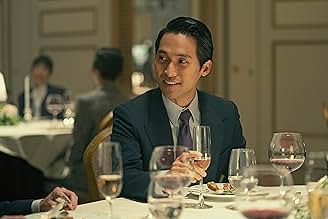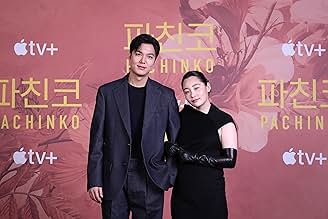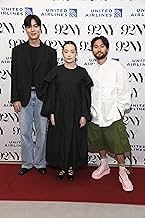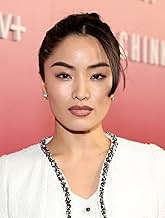Basada en el éxito de ventas del New York Times, narra las esperanzas y los sueños de una familia de inmigrantes coreanos a lo largo de cuatro generaciones mientras abandonan su tierra natal... Leer todoBasada en el éxito de ventas del New York Times, narra las esperanzas y los sueños de una familia de inmigrantes coreanos a lo largo de cuatro generaciones mientras abandonan su tierra natal en una búsqueda para sobrevivir y prosperar.Basada en el éxito de ventas del New York Times, narra las esperanzas y los sueños de una familia de inmigrantes coreanos a lo largo de cuatro generaciones mientras abandonan su tierra natal en una búsqueda para sobrevivir y prosperar.
- Nominado a 3 premios Primetime Emmy
- 15 premios ganados y 24 nominaciones en total
Explorar episodios
Opiniones destacadas
Pachinko avoids the cliches of the K-drama, instead settles for an European soap drama style with plenty of depth, chronicling the plight of a Korean family under the Japanese occupation and juxtaposing that with life in 1989, all in brilliant cinematic storytelling.
This series does not shy away from the effects of Japan's forced occupation on Korea. It plays out with an emotional impact from the viewpoint of Sunja's life via the unique structure in blending timelines. From Sunja's youth under Japan's stranglehold to that of her grandson in 1989. It depicts the various stages of Japan's influences on Sunja's family life, from war torn times to the might of the financial impact that Japan displayed during the 80's.
It is an engrossing drama that reveals the horrors of life under a brutal occupation, and the long term effects it has on generational lives. All through the eyes of a strong protagonist, Sunja, played brilliantly by the various actors.
This series does not shy away from the effects of Japan's forced occupation on Korea. It plays out with an emotional impact from the viewpoint of Sunja's life via the unique structure in blending timelines. From Sunja's youth under Japan's stranglehold to that of her grandson in 1989. It depicts the various stages of Japan's influences on Sunja's family life, from war torn times to the might of the financial impact that Japan displayed during the 80's.
It is an engrossing drama that reveals the horrors of life under a brutal occupation, and the long term effects it has on generational lives. All through the eyes of a strong protagonist, Sunja, played brilliantly by the various actors.
Great cinematography, indeed- also costumes, locations, etc- technically all perfect, and very good casting. The script does not follow the book, which changes the view on characters, giving them different vibe - and also the jumping timelineis done so often and sometimes in the middle of the scene, that it does not allow the build-up of atmosphere, is pushing so many characters at the same time and prevents the viewer to really get to know them. I believe a linear story line would have been more beneficial by allowing viewers to connect to the characters, immerse in the story and also illuminate the attitude of the next generation. It seems a bit rushed and does not really gives that feeling of the family saga. Special Kudos for Kim Minha, who nailed her first leading role, and excellent performance from Lee Min Ho was perfect in Hansu. They succeeded also in expressing the relation between their characters, which is not described even in the book as love, but as passion between a 40 years old man in a loveless marriage and an innocent teenager. Looking forward to see the next episodes !
You know the actors are talented when they can draw you into a drama in a language you don't understand. Halfway through the first episode I was fully invested in the story, transported to another time and place, caring about the fate of the characters.
The story is universal - the struggle of a family to survive and live on in the next generation. It feels very authentic, the characters - even though they don't look like me or speak the same language - are people I know, people I can relate to.
I am enjoying the heck out of this series, and I can recommend it without reservation.
The story is universal - the struggle of a family to survive and live on in the next generation. It feels very authentic, the characters - even though they don't look like me or speak the same language - are people I know, people I can relate to.
I am enjoying the heck out of this series, and I can recommend it without reservation.
10nkiliuzo
I literally do not have words to describe how good this show is, the transition between time periods, the history and the way the story is told, the actjng has been sublime, cinematography is A+, Just the whole package has been a treat, am not really a big fan of kdrama but this feels different, very different, well done apple+ for this show.
First of all, I am a Korean. I've heard a lot about what Japanese people did to Korean people during the colonial era while I was growing up. That is very sad and making us Koreans furious. Because we Koreans heard a lot about similar stories, and the storyline follows actual historical events, this show feels a little cliche in my opinion. But, I think the cinematography is one of the best I've ever seen to describe the era. It is beautifully done and seems very real. Also the show's strategy to show events not by chronically, but by weaving related events through 3,4 generations is brilliant and is making the show interesting. Overall, it is worthwhile to watch, and to the people who didn't know the history between Japan and Korea, this will be a great show to understand the history and the emotions Koreans(or other countries which were impacted by Japan during the war) have.
Although I believe we Koreans need to overcome this emotions about Japan and Japanese people, Japan also needs to admit its wrong doings in the past and truthfully express their apologies.
Although I believe we Koreans need to overcome this emotions about Japan and Japanese people, Japan also needs to admit its wrong doings in the past and truthfully express their apologies.
¿Sabías que…?
- Créditos curiososThe opening titles are a montage of Sunja and her family dancing in a pachinko parlor, interspersed with footage of Korean immigrants across various decades.
- ConexionesFeatured in WatchMojo: Top 10 Best TV Shows of 2022 (2022)
Selecciones populares
Inicia sesión para calificar y agrega a la lista de videos para obtener recomendaciones personalizadas
- How many seasons does Pachinko have?Con tecnología de Alexa
Detalles
- Tiempo de ejecución55 minutos
- Color
- Mezcla de sonido
- Relación de aspecto
- 2.20 : 1
Contribuir a esta página
Sugiere una edición o agrega el contenido que falta









































